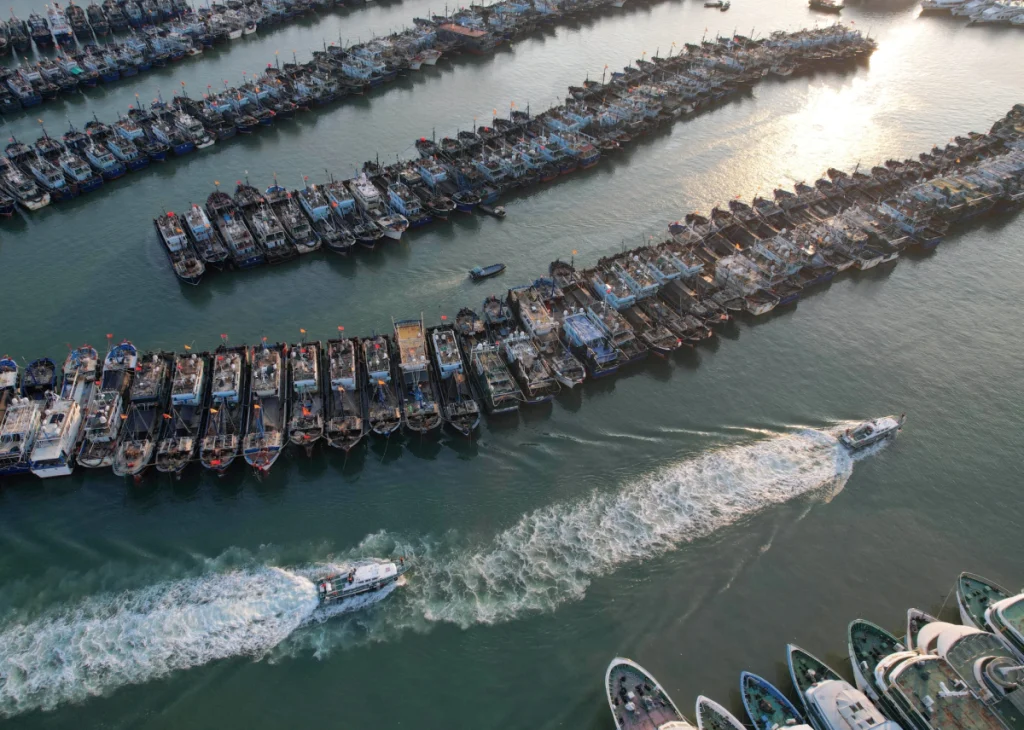China Defends Fishing Practices as Chilean Fishermen Sound Alarm
In recent months, an unprecedented surge of Chinese fishing vessels off Chile’s coast has ignited a heated dispute over marine resource management and sovereign rights in South American waters. Local fishermen report dramatic declines in Humboldt squid populations – a vital economic resource – as China’s distant-water fleet operates in international waters near Chile’s maritime boundaries. The situation highlights growing global tensions around fishing rights, sustainability, and the balance between economic interests and environmental protection.
The conflict reached a flashpoint when Chilean fishermen voiced alarm over the disappearance of Humboldt squid from their traditional fishing grounds for three consecutive months. Luis Tapia, an Iquique fishermen’s leader, made an impassioned plea for government intervention, stating, “We want a government presence, drones and coordination with neighboring countries. This isn’t just about protecting the Humboldt squid—it’s about safeguarding the entire marine ecosystem.” The fishermen’s frustration is palpable, with some describing the Chinese vessels as “termites” in their ecosystem – a metaphor reflecting their fears about rapid depletion of marine resources. This language reveals the depth of concern among local fishing communities whose livelihoods directly depend on healthy squid populations and sustainable fishing practices.
China has vigorously defended its fishing fleet against these accusations. In a statement released Friday, the Chinese Embassy in Chile asserted that China is a “responsible fisheries country” that implements stringent monitoring protocols exceeding international standards. The embassy emphasized that Chinese vessels maintain 24-hour monitoring and report their positions hourly – measures they claim demonstrate their commitment to legal fishing practices. Furthermore, Chinese officials stated that inspections by Chilean authorities confirmed their vessels were operating in compliance with both Chilean laws and international treaties, arguing there is “no evidence that Chinese fishing vessels have conducted operations within Chile’s EEZ,” and dismissing accusations of evasion and illegal fishing as “completely without factual basis.” The embassy also highlighted economic benefits their fleet brings to Chile, noting that “resupply, repair and personnel rotation of Chinese deep-sea fishing vessels in Chilean ports also contributes to generating local economic income, boosting employment and the development of the service sector.”
The statistics behind this dispute paint a concerning picture of China’s expanding global fishing footprint. China operates over half-a-million commercial fishing vessels – the world’s largest fleet – with its distant-water operations accounting for 44 percent of global fishing activity between 2022 and 2024, according to conservation group Oceana. The organization reported a dramatic increase in Chinese fishing vessel port calls in Chile – 121 this year compared to just five in 2023 and seven in 2024. This shift appears connected to changes in regional patterns, as these vessels no longer stop at Peruvian ports, which previously recorded 155 and 205 vessel visits in 2023 and 2024 respectively. The Chilean Navy has confirmed increased monitoring of foreign fishing vessels off Iquique, documenting inspections of vessels including the Chinese-flagged PU YUAN 805, though they’ve stated no foreign fishing activity has been observed within Chile’s 230-mile Exclusive Economic Zone (EEZ) where the country maintains sovereign rights over marine resources.
The situation near Chile reflects wider international tensions surrounding China’s global fishing presence. Under the United Nations Convention on the Law of the Sea, coastal states possess exclusive rights to manage and utilize all natural resources within their EEZs – including fish stocks. They may prohibit foreign vessels from fishing these waters or permit access through payment arrangements. The concerns expressed by Chilean fishermen echo similar anxieties in other regions worldwide, where Chinese distant-water fishing fleets have faced accusations of engaging in illegal, unreported, and unregulated (IUU) fishing. Earlier this year, Argentina deployed naval forces to patrol its EEZ specifically to deter foreign vessel intrusions. These incidents highlight the challenges of enforcing maritime boundaries and protecting marine resources in an era of intensifying competition for declining global fish stocks.
As this dispute unfolds, questions remain about how Chile and its South American neighbors will respond to the presence of foreign fishing vessels operating near their territorial waters. The Chilean Navy continues “constant monitoring of the foreign fishing fleet located off the coasts of Iquique, verifying compliance with current regulations and laws,” while China has stated it “actively participates in international cooperation to combat illegal, unreported, and unregulated fishing” and adopts a “zero-tolerance attitude” toward verified offenses. This standoff exemplifies the complex intersection of national sovereignty, economic interests, environmental sustainability, and international relations that characterizes modern maritime resource management. With global fish stocks under mounting pressure from climate change, pollution, and intensive harvesting, finding equitable and sustainable solutions to these conflicts has never been more urgent for coastal communities whose cultural identities and economic survival are inextricably linked to the health of ocean ecosystems.














